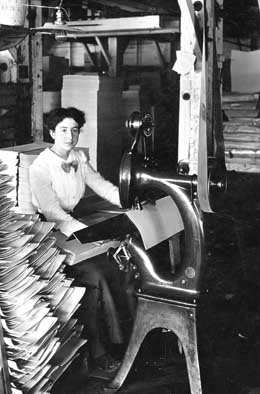On March 2, 1911, throughout the day's session, Washington State senators consider House Bill 12/Senate Bill 74, limiting women's employment to eight hours a day. The bill gains senate approval, but only with an exclusion of fishery and cannery workers.
Campaign for the Eight-Hour Day
John Campbell (1880-1924) was confident that he had the votes needed. The young Washington State House Representative from Everett met in Olympia with the Joint Committee on Labor and Labor Statistics on the evening of January 26, 1911, to discuss passage of House Bill 12. If passed, it would give Washington women an eight-hour workday.
Seattle activist Alice Lord (1877-1940) had led the way, organizing Seattle waitresses in the early 1900s and beginning the struggle for shorter working hours. A ten-hour day was the state standard, with women primarily employed in the fisheries, canneries, laundries, breweries, hotels, restaurants, and confectioneries. Many, including waitresses, worked 14-hour days, seven days a week. A failed attempt was made to introduce the "Waitresses' Bill" in 1904, which would have limited working hours to eight a day. Lord found an effective supporter in Campbell, who authored and introduced the bill during his first term as State Congressman in 1909. In that year, however, the measure failed.
Although the struggle for an eight-hour day was a cause championed worldwide as early as the 1830s, and one supported in 1870 by the American Federation of Labor, few workers actually had it. But in the dawning years of the twentieth century, Washington lawmakers supported many progressive causes.
For and Against
When Washington women gained the vote in 1910, Campbell and Lord had a new constituency -- voting women. In partnership, they began to work toward passage of the eight-hour employment bill for women. Women's clubs, churches, and religious organizations supported the measure, and women's rights leaders, including May Arkwright Hutton (1860-1915) of Spokane and Emma Smith De Voe (1848-1927) of Tacoma, successfully lobbied for the cause, gathering signatures in support of the measure.
A number of influential employers and some of their female employees arrived at the January meeting by chartered rail car, to fight the bill's passage. Seattle businessmen spoke of the grave hardships an eight-hour workday would bring them. Production speed, they insisted, would need to increase in order to balance the loss of hours. Spokane's Chamber of Commerce representative pleaded that dire economic times would result and that manufacturers would choose to locate their businesses elsewhere, should the bill be passed. Some women workers testified against the measure, fearing a cut in pay or the loss of their jobs. Upon being questioned, however, most agreed that they would be happy working only eight hours, if they would receive the same pay.
A Petition Three Blocks Long
Campbell presented the committee with the petition of signatures supporting the bill. He unrolled the document from his speaker's podium to the length of the room and back again. It was, as a Labor Journal reporter described it, a petition "three city blocks long." It was his determination, obsession, and rhetoric in support of the bill that earned John Campbell the respect of his colleagues and the nickname "8-Hour Jack."
But Senate approval was more difficult. Fisheries and canneries were a large part of Washington state's economy and their lobbyists exerted strong influence. They asked for exclusion in the eight-hour bill. Accusing the legislature of being dominated by special interests, Senator Ralph Metcalf of Pierce County declared that the eight-hour bill should apply to all female workers.
But the strong lobbyists prevailed and on March 2, 1911, the bill passed the senate, with compromise, not as it was originally written. Presented in the Senate by Jesse Huxtable of Spokane, House Bill 12 /Senate Bill 74, entitled "An act to regulate and limit the hours of employment of females in any mechanical or mercantile establishment, laundry, hotel or restaurant, except establishments in harvesting, packing, curing, canning or drying certain perishable articles ... ." was read for the first and second times and immediately passed. The bill also contained a provision (Sec. 2) that employers provide seats for their women workers. Only five senators voted against the measure.
Washington state became one of the first in the nation to grant women an eight-hour workday.

